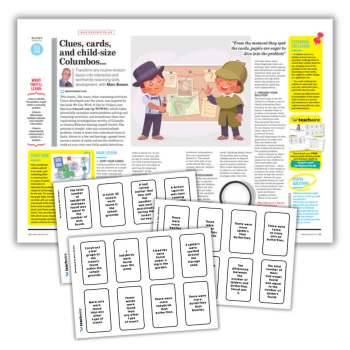Between mastery and differentiation how can teachers improve learning outcomes in primary school maths?

Is it actually possible to improve learning outcomes in numeracy within an inclusive, primary school general education classroom, asks Edu-Girl…

- by Edu-Girl

Inclusive education “enables all children regardless of gender, ethnicity, social class, ability or disability to participate successfully and on equal terms in the common curriculum” (Westwood, 2001).
It has been promoted on the basis that children have a right to be included in mainstream education, and that it is more effective (Lindsay, 2011).
And so using differentiated instruction strategies, teachers try to cater to the learning needs of a diverse groups of students. But despite their best efforts, the UK’s 2015 PISA rankings indicated that current methods of teaching were not meeting the needs of all learners (Coughlan, 6 December 2016).
And there are many understandable reasons for this.
In the classroom, supporting students with Special Educational Needs can be demanding, and teachers often lack sufficient training or knowledge about learning differences.
Learning difficulties can remain undetected and children can progress through the education system for years with unmet learning needs.
Even when a learning difficulty is detected in a child, teacher aides with no specialised subject knowledge are typically assigned to them, and the burden is then placed on the parents to source tuition outside of school hours to help their child.
Often, children who have behavioural issues can monopolise the teacher’s time, even with the assistance of a teacher aide.
And this means that the children who are focused and ready to learn are left to sit around waiting while the teacher runs around the school after a possible flight risk.
In this context, one must ask – what learning is taking place in the classroom?
Are schools merely providing a babysitting service? What about the gifted child – how does the classroom teacher have time to cater to their learning needs?
In order to improve educational outcomes, particularly in mathematics, the UK Government in 2016 announced that primary schools would receive funding to adopt the South Asian “mastery approach” (Department for Education, 2016):
…used by some of the leading performers in maths in the world, including Shanghai, Singapore and Hong Kong….The maths mastery approach is marked by careful planning, ensuring no pupil’s understanding is left to chance…. Maths mastery involves children being taught as a whole class, building depth of understanding of the structure of maths, supported by the use of high-quality textbooks.
This whole-class approach to mathematics promotes the idea of inclusive education.
However, it has been noted that catering for children with special needs in a classroom setting could be challenging for mainstream schools, especially if they are required to raise their academic standards while still embracing an inclusive agenda (Farrell, 2004).
Issues that would need to be addressed include:
- How will the mastery approach cater for learning differences? Each child will learn at their own pace. The penny will drop at different times for each of them. If one child understands the concept do they get to move on to the next concept or do they continue to rehash the same material till every child in the class masters the concept? Could boredom become an issue for the more able? Are teachers allowed to extend those students?
- What happens if said child or children have learning difficulties? How long will it take for them to master the concept? What will the rest of the class be doing while this child works with the teacher? Will the teacher have received sufficient training to understand the SEN child’s specific learning needs in order to teach them effectively and help them gain mastery?
Westwood (2001) describes research supporting the view that students with learning difficulties, particularly in basic academic skills, produce the best achievement when exposed to direct teaching, a carefully sequenced curriculum, high levels of successful responding, frequent feedback from the teacher, abundant practice in application of new skills and knowledge, explicit teaching of strategies for learning and curriculum-based assessment.
Further evidence suggests that one-to-one and small group instruction with a teacher on a regular basis would yield positive results for students with learning difficulties (Polloway, 1986; McDonnell, 2006).
Since 2016, 140 primary teachers have received training each year, to become specialists in the mastery approach to teaching maths.
Each one of these new specialist teachers will lead the professional development of further groups of teachers in schools within their maths hub area.
However, to ensure the success of students with SEN in general education classes, much more is required.
Schools need to appoint trained teachers who not only understand the mastery approach to teaching maths but also have experience of teaching children with SEN.
These maths specialists should be able to plan, teach and assess small groups and students on a one-to-one basis, regularly.
They could also provide support for the classroom teacher, during mixed-ability whole-class instruction.
In these whole-class sessions, real-world problems should be discussed and solved to help students apply their numerical skills in a range of different contexts and discover new ways of solving mathematical problems.
A variety of strategies should be utilised – from mathematical formulaic approaches to more common sense and practical ones.
This may prove to be a more effective method for achieving mastery while catering to the needs of a diverse group of learners.
Edu-Girl is providing an evidence-based approach to teaching and learning to help improve educational and social outcomes for our children. Find her at edu-girl.com and follow her on Twitter at @EdugirlEEE.










